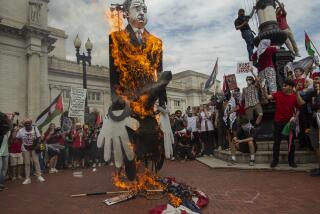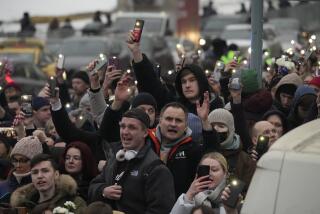Russian Conservatives Vow to Meet to Protest the Soviet Dissolution : Unrest: A Moscow rally of unlikely allies also is planned against stringent economic reforms of Yeltsin government.
- Share via
MOSCOW — In an effort to make a comeback, Russia’s conservatives--thrust into the political wilderness when the Soviet Union collapsed--plan to mount a double challenge next week to the radical democrats who now hold power here.
More than 1,400 members of the old Soviet Congress of People’s Deputies, the disintegrated country’s Parliament, have reportedly declared their intent to reconvene Tuesday in a special session to protest and even try to overturn the Soviet Union’s dissolution, in defiance of decrees from the Russian government prohibiting the meeting.
On the same day, to protest the stringent economic reforms undertaken by Russian President Boris N. Yeltsin’s government, an odd alliance of pro-Communist, ultranationalist and Orthodox religious groups plan an evening rally of more than 100,000 people in Manezh Square below the Kremlin walls.
Tuesday was chosen because it is the anniversary of a 1991 nationwide referendum in which more than 77% of voters called for the preservation of the Soviet Union as a reformed federal state, an effort that failed in the wake of the attempted coup by Communist hard-liners last summer.
“No three men, even men as powerful as Yeltsin, (Ukrainian President Leonid M.) Kravchuk or (Belarussian President Stanislav) Shushkevich, may cancel a superpower,” said Yuri Golik, a leader of the old Soviet legislature and an organizer of the planned congress session. “No one has abolished the Soviet constitution, and our voters have not revoked our mandates.”
Golik and other organizers denied any plan to try to restore the Soviet Union “as it was,” but they are adamant that “legality must be restored” and that some other, modern form of federalism must be found to bind together Russia and the other former Soviet republics.
“The congress will not reconstitute the old (Soviet) union,” said Albert M. Makashov, a senior general who was retired from the army for his ultraconservatism. “But it will provide legitimacy to the next, patriotic government of Russia, which will work to preserve what our ancestors built over millennia.”
Makashov, who ran against Yeltsin in the Russian presidential election last June, said congress organizers hope to “create a situation when Yeltsin will be forced to send his government packing and create a new one, with a totally different course and policies.” As for Yeltsin, Makashov said, “We can happily cooperate with him.”
But earlier, Ruslan Khasbulatov, chairman of the Russian legislature, called the proposed session an “absolutely illegal and unconstitutional congress.” Declaring that “it is directed against the Russian Parliament,” he banned the session and ordered police to ensure that it not be held.
Although Sazhi Z. Umalatova, head of the congress’ organizing committee, said that 1,400 of the 2,250 members of the old Congress of People’s Deputies have pledged to attend, Russian political commentators assert that the number will be much lower.
“If a congress is convened, it will be held without its former speakers,” said Ivan D. Laptev, head of Izvestia Publishing Co. and former chairman of one of the legislative chambers. “The initiators of this are simply unable to deal with reality. If they have any prospect at all, it is destabilizing society.”
Tuesday’s planned rally is an attempt to establish a united opposition out of disparate forces, ranging from strongly anti-Communist Orthodox Christians to firebrands from the Russian Communist Workers’ Party, with the focus on Yeltsin’s economic policies rather than the fate of the Soviet Union.
Viktor M. Anpilov, leader of the most radical pro-Communist group in the coalition, said they view Yeltsin’s government as subservient to sinister conspirators in the West’s corridors of power, led and represented by Harvard University professor Jeffrey D. Sachs, an economic adviser to Yeltsin. With their sharp price increases, rising unemployment and imminent factory closures, Sachs’ policies are killing Russia and its people, Anpilov charged.
This perception of a persecuted, subjugated Russia is virtually the only force binding the coalition’s constituent groups. They include the Christian Renaissance Union, Officers for the Revival of Russia, the Cossack Union, the Foundation for the Restoration of the Church of the Savior, the Russian Communist Party and the Socialist Party of the Working People.
Both the government and its opponents consequently see the next several weeks as a decisive period for the reform program--either it will finally get going, likely at a terrible cost, or it will fold up and be replaced with an emergency economic program, aimed at nothing more ambitious than survival.
The Russian leadership, in fact, is deeply divided over the priorities, policies and type of government the country should have. The government’s executive and legislative branches are increasingly in conflict; the mayors of Moscow and St. Petersburg have also been at odds with the Russian leadership.
And where the planned congress is an attempt to challenge the government’s legitimacy, the rally is more an effort to press it to change its policies.
Described by its organizers as a veche , a grand national assembly in old Russia and used as a symbol of ultimate democracy, the rally unexpectedly won permission at the end of the week from Moscow’s liberal Mayor Gavriil Popov after the Russian legislature did not prohibit it.
Khasbulatov explained, “We can’t tamper with law permitting demonstrations, no matter how unpleasant it might be for the mayor. We clearly separate these two problems.”
But Popov, chairman of the Democratic Reform Movement, was clearly displeased, and rumors swept Moscow that the mayor was actually pushing for the preventive detention of the organizers of both the rally and the congress session.
“The Supreme Soviet of Russia must declare both the congress and the demonstration unconstitutional,” Popov said earlier this week. “The state prosecutor must immediately open a criminal case against these people, and the security organs and police must act resolutely.”
Grebenshikov is a reporter in The Times’ Moscow bureau.
More to Read
Sign up for Essential California
The most important California stories and recommendations in your inbox every morning.
You may occasionally receive promotional content from the Los Angeles Times.













